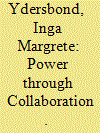| Srl | Item |
| 1 |
ID:
177132


|
|
|
|
|
| Summary/Abstract |
As the global environmental issues are increasingly coordinated through international negotiations, new methods are needed to engage citizens worldwide in the policy-making processes. In this paper, through quantitative analysis of the data from World Wide Views, we draw insight about the citizens' views on issues of climate and energy. We employed bivariate and multivariate statistical analysis to identify significance associated with public views on climate and energy. In bivariate analysis, we used non-parametric statistical tests. Logistic regression was also employed to identify association with specific variables. The results from nonparametric tests by country and country groups show statistically significant associations with citizen's views on curbing GHG emissions through renewable energy, carbon pricing, and devising policies to address climate change. The national contexts also contributed to directing citizens' views with respect to their attitudes and proposed action on climate and energy. More than any other variables, country and country group showed significant relation with public views, highlighting the complexity of global deliberative forums in issues related that transcend international boundaries. Despite common agreement toward a globally binding goal of zero emissions in the Paris agreement, we also found variation at the country level.
|
|
|
|
|
|
|
|
|
|
|
|
|
|
|
|
| 2 |
ID:
160869


|
|
|
|
|
| Summary/Abstract |
Who gets what in high-level European Union (EU) negotiations and how? This study draws on data concerning stakeholder preferences during heated negotiations leading to the EU’s 2030 Climate and Energy Policy Framework. It tests the explanatory values of Liberal Intergovernmentalism (LI), the Advocacy Coalition Framework (ACF), and Historical Institutionalism (HI). Large member states were key (LI). However, coordinated groups of member states, bound by specific common interests, also played crucial roles. ACF explains the 2030 Framework only if: a) the decisive coalitions consisted of the EU’s supranational institutions, the coordinated groups of member states and long-term advocacy coalitions in the interest group community; b) coalition members held comparatively similar views; and c) coalition members adjusted their strategies mutually and/or shared information. The European Commission set the agenda (HI). The analysis demonstrates that LI, HI and ACF may be used as complementary analytical tools, filling several of each other’s gaps.
|
|
|
|
|
|
|
|
|
|
|
|
|
|
|
|